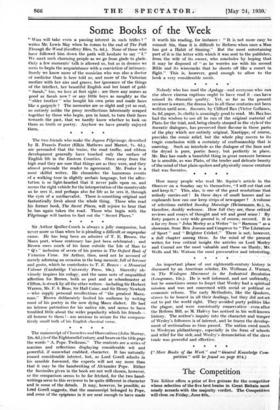An - important phase of- our eighteenth-century • history is
discussed by an American scholar, Dr. Wellman J. Warner, in . The Wesleyan Movement in the Industrial RevolutiOn (Longmans, 15s.). „He is well informed, and not unfriendly, but he sometimes seems to forget that Wesley had a spiritual mission and was not concerned with social or political. or economic reform. The early Methodists, like the .Quakers, strove to be honest in all their dealings, but they did not set out to put the world right. They avoided party politics like the plague, _ and were consistently conservative—even after the Reform Bill, as M. Halevy has noticed in his well-known history. The author's inquiry into the charactet and temper of Wesley's followers is of interest, and he traces the develop- ment of sectionalism as time passed. The nation owed much to Wesleyan philanthropy, especially in the form of schools and relief for the sick, and Wesley's denunciation of the slave trade was powerful and effective.






































 Previous page
Previous page